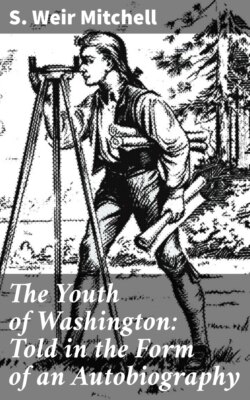Читать книгу The Youth of Washington: Told in the Form of an Autobiography - S. Weir Mitchell - Страница 13
На сайте Литреса книга снята с продажи.
V
ОглавлениеTable of Contents
In 1742 Lawrence came from Cartagena, and meant to continue in the service, but, after our sudden way, he fell in love with Anne, the daughter of William Fairfax of Belvoir, our neighbour, the cousin and agent of my lord of that name, and this, luckily for my own character, ended his desire for a military life. I too well recall the event which delayed his marriage. I was at this time, April 17, 1743, being eleven years old, on a visit to my cousins at Choptank, some thirty miles away. We were very merry at supper, when Peter, who was supposed to look after me, arrived with the news of my father’s sudden illness. It was the first of my too many experiences of the ravage time brings to all men. I heard the news with a kind of awe, but without realizing how serious in many ways was this summons. I rode home behind Peter, and found my mother in a state of distraction. She led me to the bedside of my father, crying out, “He is dying.” The children were around him, and he was groaning in great pain; but he kissed us in turn, and said to me, “Be good to your mother.” I may say that throughout her life I have kept the promise I made him as I knelt, crying, at his bedside. He died that night, and I lost my best friend.
My mother for a month talked of him incessantly, and after that very little, except to say, “If your father were alive I should be more considered.” I do not know why I, too, was averse to speaking of him, and yet I loved him above all people. But concerning such matters children are puzzled, and unable to express themselves, nor have I ever been other than shy in saying what I feel in the way of affection, whereas on paper I do not suffer this shyness, nor feel the reserve which occasioned Colonel Trumbull to say to me once that I was often unjustly regarded as cold because of my difficulty of being outspoken concerning my regard for those dear to me. I am little better of it to-day.
My father had much land and little money. As was usual in Virginia, he left to his elder sons the larger share. To Lawrence he gave his interest in the iron-works, with Mount Vernon and two thousand five hundred acres, also the resident slaves and the mill, and, in case of his failure to leave a child lawfully begotten or such child dying under age, this property was “to go to and remain” to me. To Augustine he left Wakefield; to me his farm on the Rappahannock and one moiety of his land on Deep Run, with ten negro slaves. Samuel, John, and Charles were also given land and slaves, and Betty four hundred pounds.
My mother was to have my estate for her use until I was of age, and with whatever else was left her, and her own sixteen hundred acres, might have sufficed with economy; but that virtue she found difficult to practise, and was never a prudent or managing woman. She soon felt her children to be a heavy burden upon an estate which was none too large, and complained, as was common for her to do all her life, that she was poor, and this even when I was assured that she was comfortably cared for. I never knew a more affectionate mother. She was said to have been foolishly fond of her children, and I was more than once brought to feel that her love of us did interfere with good judgment. Certainly whatever were her opinions,—and we did not often agree,—these differences never lessened my love for her, as differences often do. As she grew old her peculiarities were more and more notable. With very many good qualities, she was hard to satisfy, and this did not cease until the end of her life, for she could not be restrained from borrowing money and accepting gifts from those who were not her relations. Indeed, I once had to write her that while I had a shilling left she should never want, but that I must not be viewed as a delinquent, or be considered by the world as unjust and an undutiful son. But so was she made, and even her doctor, Thornton, wrote to me in her last illness, in which his cousin, Dr. Rush, was also consulted, that he “had every day a small battle with her.”
